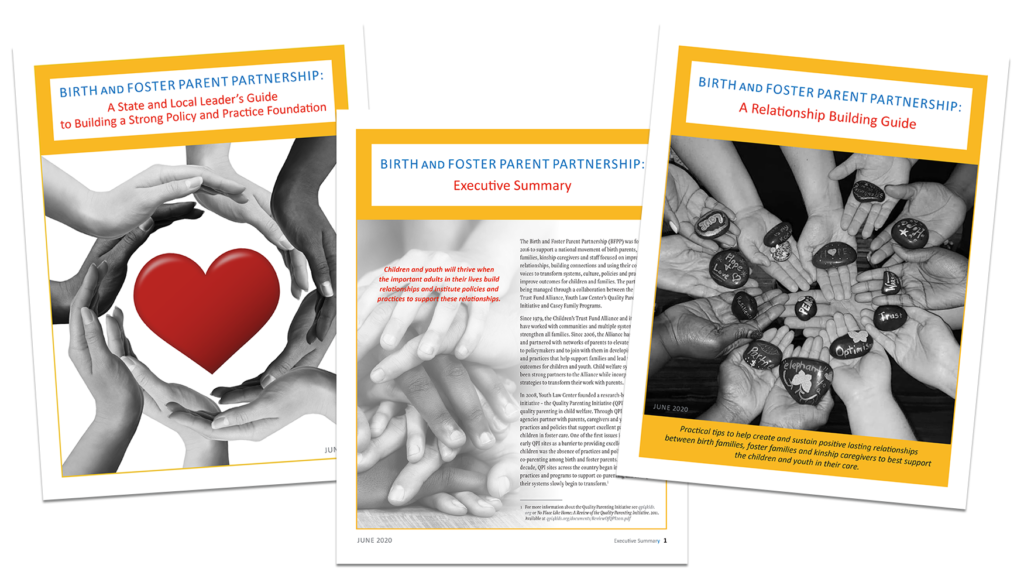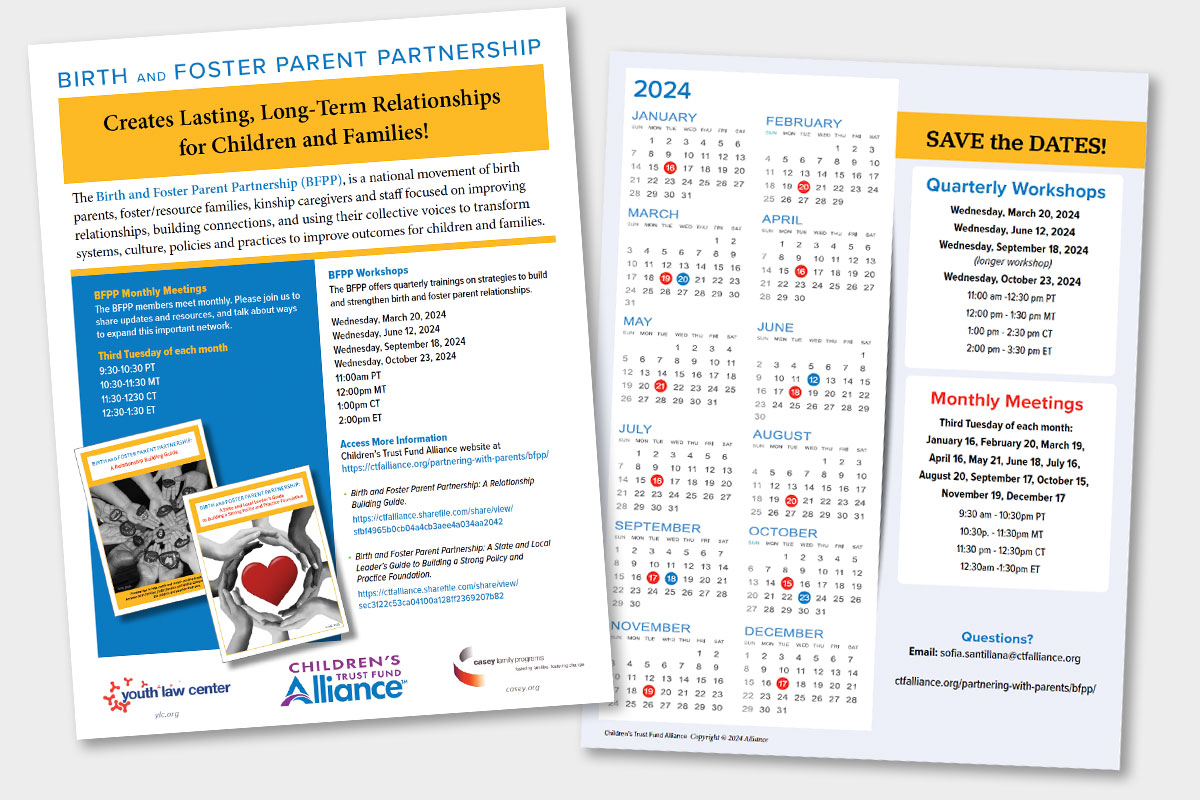Birth and Foster Parent Partnership (BFPP)
ON THIS PAGE: RESOURCES | EVENTS – RELATED PAGES: ANPPC | BPNN | TRAINING & TECHNICAL ASSISTANCE | BOOK CLUB |PARENT VOICE
A partnership of parents advocating for policy and practices that benefit children and families
Creating Authentic Partnerships Among Parents
The Birth and Foster Parent Partnership (BFPP) is an innovative approach that creates authentic partnerships among parents who advocate for policy and practices that benefit children and families. The BFPP is designed to further Casey Family Program’s (CFP’s) 2020 goals focused on the safe reduction of the number of youth in foster care. Its purpose is to increase coordination between birth parents and foster parent caregivers for improved permanency outcomes.
The partnership is managed through a collaboration between the Children’s Trust Fund Alliance (Alliance), Youth Law Center Quality Parenting Initiative (YLC/QPI) and CFP.
Resources
Tools to Build Birth and Foster Parent Relationships
Introducing two resource tools – Birth and Foster Parent Partnership: A Relationship Building Guide and the Birth and Foster Parent Partnership: A State and Local Leader’s Guide to Building a Strong Policy and Practice Foundation – created by parents and partners within the Birth and Foster Parent Partnership (BFPP). The Executive Summary offers a quick overview of the two guides which provide valuable supports to help birth and foster parents, including kin, build strong relationships and help systems institute policies and practices to support these relationships. In addition, we created a one-page “user’s guide” for how child welfare agency leaders and staff may consider introducing and using the Birth and Foster Parent Partnership: A Relationship Building Guide.
These publications were created with parents, in collaboration with the Children’s Trust Fund Alliance, Youth Law Center’s Quality Parenting Initiative and Casey Family Programs. Together, we’ve been working to highlight and develop purposeful strategies for implementation by leaders and decision makers at local, state and federal levels. We collectively believe that children and youth will thrive when the important adults in their lives build relationships and agencies prioritize these relationships through culture, practice and policy. We believe that partnerships between birth parents and foster/resource parents should be instituted as best practices in every jurisdiction across the country.
Download the BFPP Relationship Tools
- BFPP: Executive Summary
- BFPP: A State and Local Leader’s Guide to Building a Strong Policy and Practice Foundation
- BFPP: A Relationship Building Guide
- Recommendations for Using the BFPP: A Relationship Building Guide
- Chart 1. Building the Relationship
- Chart 2. Supporting the Relationship
- Chart 3. Keeping the Relationship Strong while Working with the System and Planning for Reunification
- Chart 4. Keeping the Relationship Strong after the Family Leaves the Child Welfare System
- BFPP: Resource Tools Flyer
Previous Events
Child-Centered Parent Partnerships: A State And Local Leader’s Guide To Building A Strong Policy And Practice Foundation
August 17, 2023
The Birth and Foster Parent Partnership (BFPP) in collaboration Youth Law Center Parenting Initiative (YLC/QPI) hosted a workshop on August 17, 2023. The workshop highlighted the critical role state and local leaders play in developing, implementing, and sustaining child-centered parent partnership policies and practices.
Participants learned how agency leaders across the QPI network are working to build, strengthen, and support strong parent partnerships, centering the needs and experiences of children to ensure excellent parenting every day for every child in care. During the webinar presenters explored successful strategies for building trust, collaboration, and communication between parents and child welfare professionals.
The webinar also covered key areas of policy development and promising practices that support child-centered parent partnerships.
By the end of the workshop, participants gained an increased understanding of how to build and sustain effective child-centered parent partnerships and were given practical tools and strategies for implementing policy and practice changes in their organizations and communities.
The BFPP partnership is managed through a collaboration between the Children’s Trust Fund Alliance (CTFA), Youth Law Center Parenting Initiative (YLC/QPI) and Casey Family Programs (CFP).
What’s Next? Transforming Practice Through Partnerships, Policy and Prevention
Sept. 13 and 14, 2022 Virtual Convening
During this two-day virtual convening, representatives of the Birth and Foster Parent Partnership (BFPP) came together to share and learn from parents and leaders, engage in lively discussions, reconnect with colleagues and build new relationships. The convening provided member with the opportunity to:
- Engage participants in discussions with key leaders, researchers and policymakers regarding important policies and practices related to birth and foster parents/kinship caregivers.
- Learn from birth parents and foster parents/kinship caregivers who are making a positive difference in their communities, states and systems, including examples from multiple states.
- Participate in interactive activities between birth parents and foster parents/kinship caregivers to build connections and share expertise.
- To learn about research on the protective factor: concrete supports for families in times of need.
On Sept. 13–Day 1 the convening opened with Joseph E. Ribsam, Director, New Hampshire Division for Children, Youth and Families sharing some innovative trends happening in New Hampshire’s Birth and Foster Parent Partnership work and its impact in helping to support families. Also, on day 1, members had the opportunity to participate in various small group discussions on topics such as: Father relationships and engaging fathers in birth and foster parent partnerships; supporting sibling relationships; LGBTQ issues related to birth and foster/kinship caregiver and youth in care; Comfort calls, family introductions and icebreakers; relationship building and cultural identity; and how to move practice to policy and policy to practice.
Sept. 14–Day 2 of the virtual convening began with an interactive panel presentation on Relationship Building Between Birth Parents and Kinship Caregivers. Next up was a powerful dialogue with January Contreras, Assistant Secretary, Administration for Children and Families. Day 2 ended with a presentation and discussion on Chapin Hall’s research on the protective factor – concrete supports for families in times of need.
Download Convening Materials
The following handouts and tools were distributed during the BFPP virtual convening and are available to download:
Transformation: Celebrating Partnerships
Sept. 14 and 15, 2021 Virtual Convening
During this two-day virtual convening, representatives of the Birth and Foster Parent Partnership (BFPP) discussed transforming practices to improve relationships and build strong connections. The convening started with Aysha E. Schomburg, Esq., Associate Commissioner, Children’s Bureau, ACYF, ACF, HHS, talking about why it is important to reshape foster care as a support to families.
Also, on Sept. 14–Day 1, a panel of birth and foster parents from Florida and Minnesota shared highlights of new state legislation mandating partnerships. The next presentation highlighted an innovative public/private statewide birth parent and resource parent initiative with the Oregon Child Welfare system. Day 1 ended with members of a BFPP National Workgroup sharing their perspectives and experience with the BFPP tools – A Relationship Building Guide and A State and Local Leader’s Guide to Building a Strong Policy and Practice Foundation.
Sept. 15–Day 2 of the virtual convening began with an interactive session with Vanessa Dorantes, Commissioner of Connecticut Department of Children and Families who has committed to supporting birth and foster parent partnerships. Next up was a presentation about the Washington State Building Family Partnerships Initiative. Day 2 ended with a discussion of communication tools and messaging strategies to help normalize parent partnerships and encourage a supportive environment to help families thrive through these powerful relationships.
Download Convening Materials
The following handouts and tools were distributed during the BFPP virtual convening and are available to download:
Day 1–09/14/21 BFPP Virtual Convening Recording (3 hours)
Day 2–09/15/21 BFPP Virtual Convening Recording (2:43 hours)
Sept. 15, 2020 Webinar
Building Birth and Foster Parent Relationships to Promote Reunification: A Panel Discussion
During this moderated panel discussion, representatives of the Birth and Foster Parent Partnership (BFPP) and Dr. Jerry Milner, Associate Commissioner, Children’s Bureau, talked about Building Birth and Foster Parent Relationships to Promote Reunification. The BFPP’s resources – A Relationship Building Guide and A State and Local Leader’s Guide to Building a Strong Policy and Practice Foundation – were highlighted. BFPP birth and foster/resource parents discussed using these new tools to help birth and foster parents build strong relationships and to help systems institute policies and practices to support these relationships. Dr. Milner discussed the Children’s Bureau’s support for birth and foster parent relationships at the policy level.
The guides and their supporting tools – Executive Summary and Users Guide – are available to download in the Resources section above.

